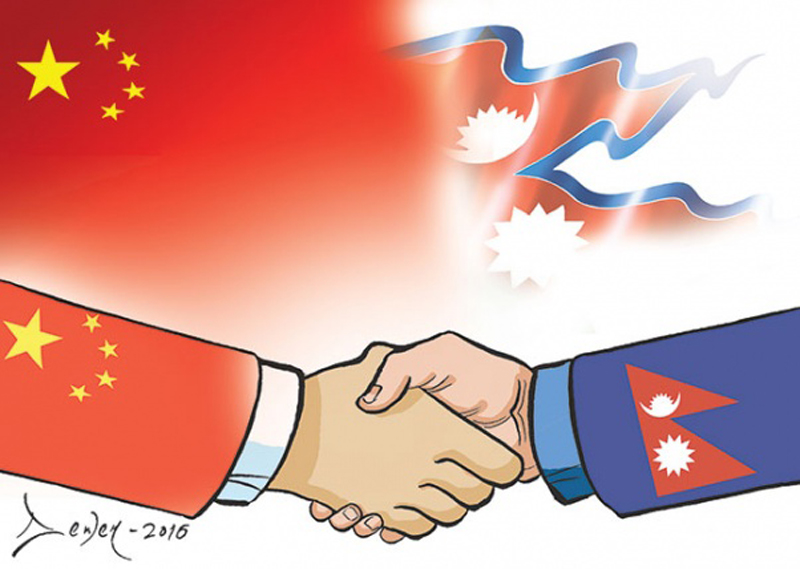
OR
Beyond Borders


Biswas Baral
Biswas Baral has been associated with Republica national daily as a journalist since 2011. He oversees the op-ed pages of Republica and writes and reports on Nepal's foreign affairs. He is a regular contributor to The Wire (India).biswas.baral@myrepublica.com
More from Author
With no substantial bilateral deal in the offing, and Kathmandu inching closer to New Delhi, there was no reason for Chinese president to come
Chinese President Xi Jinping, in all likelihood, is not coming to Nepal anytime soon. In fact, the Chinese had at no point given a clear green signal that Xi would be visiting Nepal. Back in June, a senior Chinese army officer, Sun Jianguo, was in Kathmandu, supposedly to lay the ground for President Xi’s Nepal visit on his way back from the annual BRICS summit in Goa, India in the middle of October. The Chinese refused to give a clear date for Xi’s date because at the time of Sun Jianguo’s Kathmandu visit, the air of the Nepali capital was already thick with rumors of an imminent change of guard. But, according to government sources, he also dropped enough hints that Xi would come if Oli survived until October.
China’s worst fears came true when, at the start of August, Pushpa Kamal Dahal finally pulled the plug on KP Oli government, on which China had pinned such high hopes.
Breaking with its traditional restraint, the Chinese actively lobbied for the continuity of the communist coalition. For it genuinely believed that the UML-Maoist coalition was serious about taking Nepal-China relations to a new height, even at the risk of alienating the Indian establishment. The Chinese had a reason to be optimistic.
After last year’s border blockade, Oli as prime minister had made a concerted effort to diversify Nepal’s trade relations away from India, and rightly so: it is not in Nepal’s interest to so completely depend on one country. As Oli saw it, for the landlocked Nepal, this naturally translated into closer ties with Beijing.
True, his government could have shown greater initiative to implement recent deals with China. Nonetheless it was a government trusted by China. The Chinese were dead serious about extending the Lhasa-Shigatse rail link up to Keyrung on Nepali border and about offering Nepal an alternate trade route, thereby breaking India’s monopoly on Nepal’s third-country trade. It was also interested in other big infrastructure projects. But then the Oli government suddenly collapsed, to the jubilation of the establishment types in New Delhi. Beijing was greatly dismayed.
(Old) Chinese characters
China above all prizes policy stability in the countries it likes to do business with. And it had started to genuinely feel that the communist coalition in Kathmandu would endure for sometime, allowing it to implement recent agreements. But then Oli got greedy and refused to make way for Pushpa Kamal Dahal, as was initially agreed at the time of formation of the communist coalition government at the fag end of 2015. The Chinese hinted to Oli that he should not hesitate to make way for Dahal in order to save the coalition, but Oli didn’t listen.
Meanwhile, India was ramping up pressure on Dahal as it threatened to drag him before international court for war crimes. Dahal in the end decided that if he ditched Oli he could kill two birds with a single stone: escape war crimes and get to be the prime minister for the second time.
So the new government was formed and right from the start Dahal made a concerted effort to woo New Delhi, going so far as to preposterously claim that he shared some kind of ‘chemistry’ with Narendra Modi. He said he was also ready to atone for his ‘past mistakes’ that had riled India during his first term. The new Dahal government also showed no inclination to implement recent deals with China. In Beijing’s eyes, notwithstanding his legitimate claim to leadership of the communist coalition, Dahal betrayed them.
In this backdrop, with no substantial bilateral deal in the offing, and Kathmandu once again looking to inch closer to New Delhi, there was no reason for the Chinese president to come. This much was quietly but unambiguously communicated to Nepali officials.
So what do we make of recent remark of Hua Chunying, the spokesperson of the Chinese foreign ministry, that “we can’t say if it’s [President Xi’s Nepal visit] been cancelled or not”. The transcript of the press conference in which she spoke (and which is now posted on the website of the Chinese foreign ministry) is instructive.
The question that was posed to her was: “According to reports in Nepal, the Chinese leader will postpone or cancel his visit to Nepal scheduled for October. Can you confirm and give us more details? How does China view its relationship with Nepal after Prachanda took the helm as prime minister?”
Her answer, as it appears on the website: “We have been in communication with the Nepali side through the diplomatic channel about high-level exchanges between the two countries.” Translation: The October visit has been cancelled. Perhaps we could arrange something for a future date. Interestingly, gone is ambiguous “cancelled or not” line she uttered at the press meet.
“The Chinese side commends the new Nepali government for their continuous emphasis on relations with China,” she continues. “Guided by the concept of amity, sincerity, mutual benefit and inclusiveness, we will work with Nepal to strive for new progress in bilateral relations.” Translation: We will continue to engage with Nepal government just like we engage with the governments of other countries.
(New) Nepali script
Unless there is a dramatic change in ground realities in Nepal, President Xi won’t come—at least not in 2016. But this is not because China sees that Nepal has once again gone into the ‘Indian sphere’. I think China understands that it is futile to try to match India’s influence in Nepal, which is why it has repeatedly pushed the concept of trilateral cooperation between the three countries, most notably on rail connectivity.
This, however, is not to imply that there is no strategic calculation behind the decision to cancel Xi’s October trip. The Chinese are increasingly concerned by the growing strategic ties between India and the US, China’s chief rival for global prominence. China views this as part of a strategy to ‘encircle’ it, something India can’t manage on its own.
Traditionally, too, the concept of encirclement has featured high in Chinese foreign policy calculus, and something it tries to avoid at all cost.
So even though the Chinese are not as preoccupied with the emergence of India as its strategic threat on its own, they do remain concerned about machinations of Western powers in South Asia using India as their proxy. Hence in recent times China has made a concerted effort to deepen its engagements with all South Asian countries, largely to minimize the prospect of encirclement in the region by a (US-backed) ‘democratic’ alliance.
Whether Xi comes or not, there is now a groundswell of support for greater engagement with China. There is common understanding on the need to diversify into China, and away from India, to protect our national interest. It would thus be wrong to see greater engagement with China as the agenda only of Oli-leaning nationalists. It is a concern of all Nepalis who want to see greater (if not a perfect) balance in Nepal’s relations with its two neighbors.
Twitter: @biswasktm
You May Like This

Hug me, and say you love me
Fall in love—an unconditional stimulus And let me love: the paradox of your choice ... Read More...

My reason to live
I try to turn the page of the story, there’s lot of pain inside my heart. Not a boy, I... Read More...

You and me, and everybody else
In our culture (and by that I mean Nepali and Indian both since I’m a Nepali who’s married and lives... Read More...




Just In
- MoHP cautions docs working in govt hospitals not to work in private ones
- Over 400,000 tourists visited Mustang by road last year
- 19 hydropower projects to be showcased at investment summit
- Global oil and gold prices surge as Israel retaliates against Iran
- Sajha Yatayat cancels CEO appointment process for lack of candidates
- Govt padlocks Nepal Scouts’ property illegally occupied by NC lawmaker Deepak Khadka
- FWEAN meets with President Paudel to solicit support for women entrepreneurship
- Koshi provincial assembly passes resolution motion calling for special session by majority votes







_20220508065243.jpg)






Leave A Comment